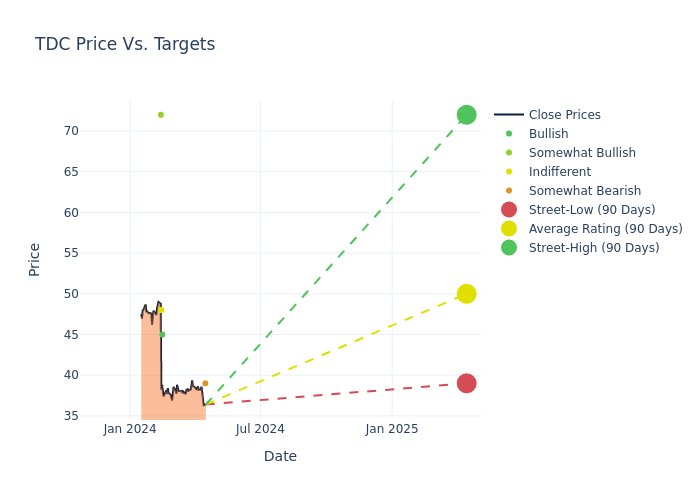In the preceding three months, 8 analysts have released ratings for Teradata TDC, presenting a wide array of perspectives from bullish to bearish.
In the table below, you'll find a summary of their recent ratings, revealing the shifting sentiments over the past 30 days and comparing them to the previous months.
| Bullish | Somewhat Bullish | Indifferent | Somewhat Bearish | Bearish | |
|---|---|---|---|---|---|
| Total Ratings | 2 | 1 | 3 | 2 | 0 |
| Last 30D | 0 | 0 | 0 | 1 | 0 |
| 1M Ago | 0 | 0 | 0 | 0 | 0 |
| 2M Ago | 1 | 0 | 0 | 0 | 0 |
| 3M Ago | 1 | 1 | 3 | 1 | 0 |
The 12-month price targets, analyzed by analysts, offer insights with an average target of $50.38, a high estimate of $72.00, and a low estimate of $39.00. Observing a downward trend, the current average is 11.16% lower than the prior average price target of $56.71.

Understanding Analyst Ratings: A Comprehensive Breakdown
An in-depth analysis of recent analyst actions unveils how financial experts perceive Teradata. The following summary outlines key analysts, their recent evaluations, and adjustments to ratings and price targets.
| Analyst | Analyst Firm | Action Taken | Rating | Current Price Target | Prior Price Target |
|---|---|---|---|---|---|
| Raimo Lenschow | Barclays | Lowers | Underweight | $39.00 | $43.00 |
| Tyler Radke | Citigroup | Lowers | Buy | $45.00 | $60.00 |
| Erik Woodring | Morgan Stanley | Lowers | Equal-Weight | $48.00 | $74.00 |
| Wamsi Mohan | B of A Securities | Lowers | Neutral | $48.00 | $58.00 |
| Matthew Hedberg | RBC Capital | Lowers | Sector Perform | $48.00 | $59.00 |
| Patrick Walravens | JMP Securities | Maintains | Market Outperform | $72.00 | - |
| Raimo Lenschow | Barclays | Lowers | Underweight | $43.00 | $46.00 |
| Tyler Radke | Citigroup | Raises | Buy | $60.00 | $57.00 |
Key Insights:
- Action Taken: Analysts adapt their recommendations to changing market conditions and company performance. Whether they 'Maintain', 'Raise' or 'Lower' their stance, it reflects their response to recent developments related to Teradata. This information provides a snapshot of how analysts perceive the current state of the company.
- Rating: Unveiling insights, analysts deliver qualitative insights into stock performance, from 'Outperform' to 'Underperform'. These ratings convey expectations for the relative performance of Teradata compared to the broader market.
- Price Targets: Analysts explore the dynamics of price targets, providing estimates for the future value of Teradata's stock. This examination reveals shifts in analysts' expectations over time.
Navigating through these analyst evaluations alongside other financial indicators can contribute to a holistic understanding of Teradata's market standing. Stay informed and make data-driven decisions with our Ratings Table.
Stay up to date on Teradata analyst ratings.
Get to Know Teradata Better
Teradata Corp provides analytic data products and related services. The Company operates in data and analytics, which captures, integrates, stores, manages, and analyzes data of all types to answer business questions and deliver insight; and marketing applications, which offer marketing management products to help businesses win customer loyalty. Its solutions include components such as data warehousing, Asset optimization, Fraud prevention, Product innovation, and risk mitigation. A majority of the firm's revenue is generated in the United States.
Breaking Down Teradata's Financial Performance
Market Capitalization: With restricted market capitalization, the company is positioned below industry averages. This reflects a smaller scale relative to peers.
Revenue Growth: Teradata's revenue growth over a period of 3 months has been noteworthy. As of 31 December, 2023, the company achieved a revenue growth rate of approximately 1.11%. This indicates a substantial increase in the company's top-line earnings. When compared to others in the Information Technology sector, the company faces challenges, achieving a growth rate lower than the average among peers.
Net Margin: Teradata's net margin is below industry standards, pointing towards difficulties in achieving strong profitability. With a net margin of -1.53%, the company may encounter challenges in effective cost control.
Return on Equity (ROE): Teradata's ROE falls below industry averages, indicating challenges in efficiently using equity capital. With an ROE of -5.45%, the company may face hurdles in generating optimal returns for shareholders.
Return on Assets (ROA): Teradata's ROA is below industry averages, indicating potential challenges in efficiently utilizing assets. With an ROA of -0.39%, the company may face hurdles in achieving optimal financial returns.
Debt Management: Teradata's debt-to-equity ratio surpasses industry norms, standing at 4.74. This suggests the company carries a substantial amount of debt, posing potential financial challenges.
What Are Analyst Ratings?
Benzinga tracks 150 analyst firms and reports on their stock expectations. Analysts typically arrive at their conclusions by predicting how much money a company will make in the future, usually the upcoming five years, and how risky or predictable that company's revenue streams are.
Analysts attend company conference calls and meetings, research company financial statements, and communicate with insiders to publish their ratings on stocks. Analysts typically rate each stock once per quarter or whenever the company has a major update.
Analysts may enhance their evaluations by incorporating forecasts for metrics like growth estimates, earnings, and revenue, delivering additional guidance to investors. It is vital to acknowledge that, although experts in stocks and sectors, analysts are human and express their opinions when providing insights.
This article was generated by Benzinga's automated content engine and reviewed by an editor.
© 2025 Benzinga.com. Benzinga does not provide investment advice. All rights reserved.
date | ticker | name | Price Target | Upside/Downside | Recommendation | Firm |
|---|
Trade confidently with insights and alerts from analyst ratings, free reports and breaking news that affects the stocks you care about.